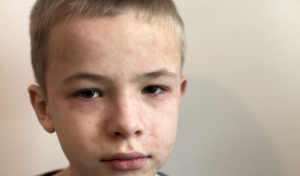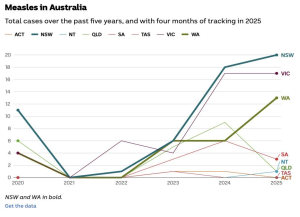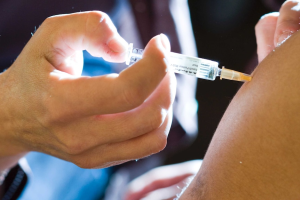Title: How to deal with Australia’s heat-seeking missile–measles in 2025? Policy and science popularization go hand in hand, with special attention to vulnerable groups.
Targeted Media Outlet: ABC News (Australian Version)
News Narrative Genre: News Commentary
Introduction
From 1 January to 19 March, 2025, a total of 54 confirmed cases of measles were reported nationwide in Australia. Finding effective approaches to prevent and control measles outbreaks and ensuring the health and safety of the public, has become a focus of public attention.

There have already been several measles outbreaks in Australia this year. https://www1.racgp.org.au/getattachment/80ab6499-77fc-4c6a-858d-8119def89bce/attachment.aspx
Background and Data Support
Measles is a highly infectious virus that spreads through the air, easily leading to complications and fatalities. This disease poses a significant threat to children, pregnant women and those with weakened immune systems. Professor Peter Kasso, an American virologist points out that measles may harm a person’s lungs and immune systems, as well as causing permanent brain damage. He emphasizes that the current two-dose vaccine regimen is 97% effective in preventing measles. According to the data released by the Australian Government Department of Health and Aged Care, As of 30 January, 2025, it shows that 92.49% of one-year-old children, 90.72% of two-year-old children and 93.76% of five-year-old children have completed their measles vaccinations.

https://www.abc.net.au/news/2025-04-10/measles-cases-outbreak-australia/105156008?utm_campaign=abc_news_web&utm_content=link&utm_medium=content_shared&utm_source=abc_news_web.
Core Argument
There is a need that the government should promote both policy measures and public science to enhance public’s trust and confidence in measles vaccination. The government should also increase financial input to guarantee broad access to measles vaccines while enhancing health education and promoting awareness campaigns. In addition to strengthen the monitoring and management of measles cases, medical institutions should improve their vaccination services. Special attention should be placed on vulnerable groups, including pregnant women, children who have not been vaccinated and adults who only received a single dose of the vaccine before 1992. These people face a higher risk of contracting the measles virus.
Measles is one of the most contagious viruses in the world but is preventable by two doses of vaccine. (Reuters: Valentin Flauraud)https://live-production.wcms.abc-cdn.net.au/b1dc70d383eec1b21405d95405141bd9?impolicy=wcms_crop_resize&cropH=1997&cropW=3000&xPos=0&yPos=34&width=862&height=575
Selected Publication and Audience Value
The online news media company ABC News will be the selected Publication. This organization has a broad range of platform services, which is effective for popularizing information and updated news associated with measles. The targeted audience for this news includes individuals in Australia who are concerned about health and medical development, policymakers and professionals from medical sectors, and people from the international community with an interest in Australia. It will increase the public’s understanding of measles and enhance their ability to prevent this health risk. It will also call on policymakers and medical institutions to prioritize the issue and take efficient macro strategies, such as promoting free measles vaccines policy in a wider range. Additionally , it alerts vulnerable groups to recognize the potential dangers during a measles outbreak and protect themselves better.
Information Source (Interview Plan)
The anticipated interviewees includes: a clinic doctor in Australia, a community worker, two local Australians (one is a pregnant woman), and an international student studying in Australia.
Presentation Design
This news commentary will include medical science popularization videos about measles, as well as pictures on the theme of measles, such as vaccination scenes. It will also include data and tables on confirmed measles cases or measles vaccination records. Additionally, it can post some online questionnaires or voting at the end to help assess the prevalence of measles in Australia as well as the public’s understanding of this disease.
Tags: Australia; Australian Government Department of Health and Aged Care; Immunity; Infectious Diseases; Measles; Medical Research; MMR; Public Health; Vaccines and immunization; Vulnerable Groups
Word Count: 490 words (excluding headings, tags and counting from the introduction sections)





The topic of this article has high news value. It focuses on the major public health issue of measles recurrence and pays attention to vulnerable groups, which reflects good social care. Hyperlinks, pictures and subheadings are used reasonably to make the article clear and easy to read. However, since the perspective of the article is policy and popular science, it may be more targeted and authoritative if the voices of some policymakers can be added to the interview part. And based on this good perspective, when it in terms of implementation, more actual cases and standpoint could be explored, such as: Which policies really work? Which popular science activities have failed? Why? Does the author think that the government’s policy formulation is reasonable? Discussing these aspects may enrich the content of the article.